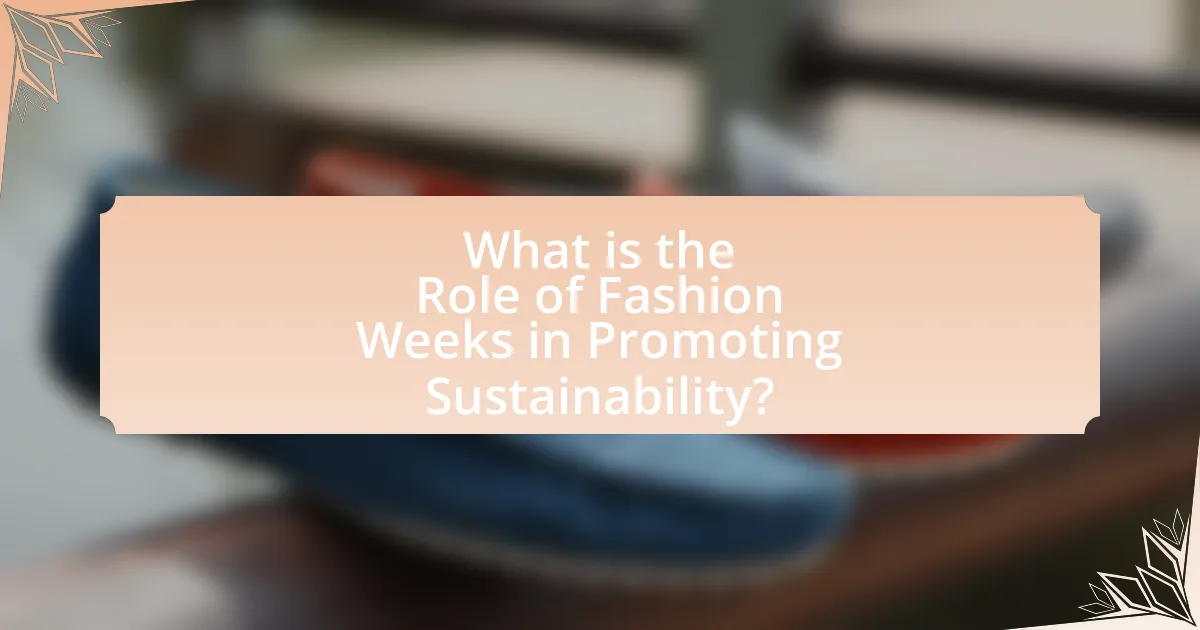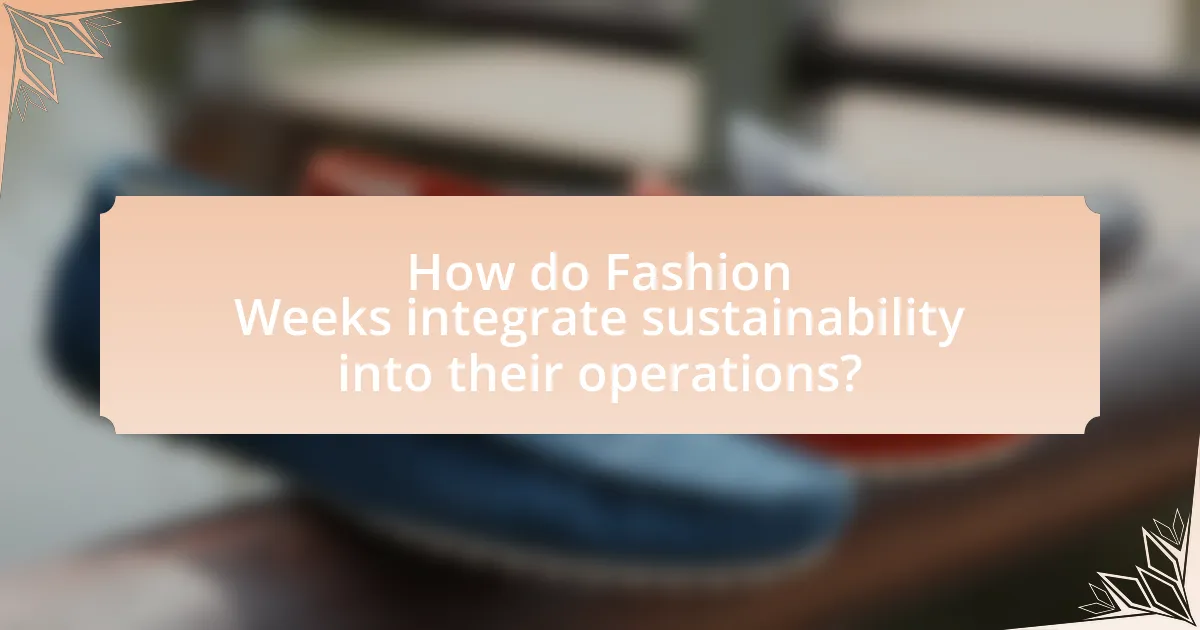Fashion Weeks serve as pivotal platforms for promoting sustainability within the fashion industry by showcasing eco-friendly designs and raising awareness about sustainable practices. These events encourage designers to adopt ethical production methods and utilize sustainable materials, influencing consumer behavior and industry standards. Key initiatives include the implementation of sustainability action plans, discussions on responsible fashion, and the integration of digital technologies to reduce environmental impact. As Fashion Weeks evolve, they increasingly highlight the importance of circular fashion, zero-waste practices, and partnerships with sustainable organizations, ultimately driving a cultural shift towards more responsible consumption in fashion.

What is the Role of Fashion Weeks in Promoting Sustainability?
Fashion Weeks play a crucial role in promoting sustainability by showcasing eco-friendly designs and raising awareness about sustainable practices within the fashion industry. These events provide a platform for designers who prioritize sustainable materials and ethical production methods, thereby influencing consumer behavior and industry standards. For instance, the Copenhagen Fashion Week has implemented a sustainability action plan that requires participating brands to meet specific environmental criteria, demonstrating a commitment to reducing the industry’s carbon footprint. Additionally, Fashion Weeks often feature discussions and panels on sustainability, further educating stakeholders and the public about the importance of responsible fashion choices.
How do Fashion Weeks influence sustainable practices in the fashion industry?
Fashion Weeks influence sustainable practices in the fashion industry by showcasing eco-friendly designs and encouraging brands to adopt sustainable methods. Major events like New York, Paris, and Milan Fashion Weeks have increasingly featured collections that prioritize sustainable materials, ethical production, and reduced waste. For instance, the 2021 Copenhagen Fashion Week implemented a sustainability action plan that required participating designers to meet specific environmental criteria, thereby setting a precedent for other Fashion Weeks. This shift not only raises awareness among consumers but also pressures brands to innovate and align with sustainability goals, as evidenced by the rise in brands committing to sustainable practices following their participation in these high-profile events.
What are the key sustainability initiatives showcased during Fashion Weeks?
Key sustainability initiatives showcased during Fashion Weeks include the use of eco-friendly materials, zero-waste design practices, and the promotion of circular fashion. Fashion designers are increasingly incorporating organic fabrics, recycled materials, and biodegradable textiles into their collections, which reduces environmental impact. Additionally, many brands are adopting zero-waste design techniques that minimize fabric waste during production. Circular fashion initiatives, such as rental services and take-back programs, are also highlighted, encouraging consumers to reuse and recycle garments. These initiatives reflect a growing commitment within the fashion industry to address environmental concerns and promote sustainable practices.
How do designers incorporate sustainability into their collections for Fashion Weeks?
Designers incorporate sustainability into their collections for Fashion Weeks by utilizing eco-friendly materials, implementing ethical production practices, and promoting circular fashion concepts. For instance, many designers now source organic cotton, recycled fabrics, and biodegradable materials to reduce environmental impact. Additionally, they often collaborate with local artisans to ensure fair labor practices and minimize carbon footprints associated with transportation. A notable example is Stella McCartney, who has consistently used sustainable materials and practices in her collections, setting a benchmark in the industry. This approach not only addresses environmental concerns but also resonates with a growing consumer demand for responsible fashion, as evidenced by a 2021 McKinsey report indicating that 67% of consumers consider sustainability when making a purchase.
Why are Fashion Weeks important for raising awareness about sustainability?
Fashion Weeks are important for raising awareness about sustainability because they serve as a global platform for designers and brands to showcase eco-friendly practices and sustainable fashion innovations. By featuring collections that prioritize sustainable materials, ethical production methods, and environmental consciousness, Fashion Weeks influence industry standards and consumer behavior. For instance, the 2021 Copenhagen Fashion Week implemented a sustainability action plan that required participating brands to meet specific environmental criteria, thereby setting a precedent for future events. This visibility helps educate the public and industry stakeholders about the importance of sustainability in fashion, ultimately driving demand for more responsible practices.
How do Fashion Weeks serve as a platform for sustainable brands?
Fashion Weeks serve as a platform for sustainable brands by providing visibility and access to influential audiences, including buyers, media, and consumers. These events highlight innovative sustainable practices and eco-friendly designs, allowing brands to showcase their commitment to sustainability on a global stage. For instance, the Copenhagen Fashion Week has implemented a sustainability requirement for participating brands, emphasizing the importance of environmental responsibility in the fashion industry. This initiative not only promotes sustainable brands but also encourages others to adopt similar practices, thereby fostering a broader cultural shift towards sustainability in fashion.
What impact do Fashion Weeks have on consumer perceptions of sustainability?
Fashion Weeks significantly influence consumer perceptions of sustainability by showcasing eco-friendly practices and sustainable fashion brands. These events often highlight designers who prioritize ethical production methods, use of sustainable materials, and innovative recycling techniques, thereby raising awareness among attendees and viewers. For instance, the 2021 Copenhagen Fashion Week implemented a sustainability action plan that required participating brands to meet specific environmental criteria, which garnered media attention and consumer interest in sustainable fashion. This visibility can shift consumer attitudes, making sustainability a more prominent factor in purchasing decisions.

How do Fashion Weeks integrate sustainability into their operations?
Fashion Weeks integrate sustainability into their operations by implementing eco-friendly practices, showcasing sustainable collections, and promoting ethical fashion. For instance, many Fashion Weeks now require designers to adhere to sustainability guidelines, which include using organic materials, reducing waste, and minimizing carbon footprints. Additionally, events like New York Fashion Week have introduced initiatives such as the “Fashion Sustainability and Social Accountability Act,” which encourages transparency in the supply chain. These measures reflect a growing commitment within the fashion industry to address environmental concerns and promote responsible consumption.
What logistical changes are made to promote sustainability during Fashion Weeks?
Logistical changes made to promote sustainability during Fashion Weeks include the use of eco-friendly venues, digital invitations, and sustainable transportation options. Eco-friendly venues minimize environmental impact by utilizing energy-efficient systems and sustainable materials. Digital invitations reduce paper waste, while sustainable transportation options, such as electric vehicles and public transport, lower carbon emissions associated with travel. These changes reflect a growing commitment within the fashion industry to reduce its ecological footprint during high-profile events.
How do venues and organizers prioritize eco-friendly practices?
Venues and organizers prioritize eco-friendly practices by implementing sustainable event management strategies. These strategies include using renewable energy sources, minimizing waste through recycling and composting, and selecting sustainable materials for event setups. For instance, many fashion weeks have adopted digital invitations to reduce paper waste and have partnered with local vendors to decrease transportation emissions. Additionally, according to a report by the Global Fashion Agenda, 75% of fashion events are now incorporating sustainability into their planning processes, demonstrating a significant shift towards eco-conscious practices in the industry.
What role do partnerships with sustainable organizations play in Fashion Weeks?
Partnerships with sustainable organizations play a crucial role in Fashion Weeks by enhancing the industry’s commitment to environmental and social responsibility. These collaborations enable designers and brands to showcase eco-friendly practices, materials, and innovations, thereby influencing consumer perceptions and industry standards. For instance, initiatives like the Sustainable Fashion Initiative at New York Fashion Week have highlighted the importance of ethical sourcing and waste reduction, leading to increased awareness and adoption of sustainable practices among participants. Such partnerships not only promote sustainability but also drive industry-wide changes, as evidenced by the growing number of brands committing to sustainable practices following their involvement in these events.
How do Fashion Weeks address the challenges of sustainability?
Fashion Weeks address the challenges of sustainability by showcasing eco-friendly designs and promoting sustainable practices among designers and brands. These events increasingly feature collections made from organic materials, recycled fabrics, and innovative technologies that reduce environmental impact. For instance, the Copenhagen Fashion Week has implemented a sustainability action plan that requires participating brands to meet specific environmental criteria, thereby encouraging a shift towards more responsible production methods. Additionally, Fashion Weeks often serve as platforms for discussions on sustainability, bringing together industry leaders to share insights and strategies for reducing waste and carbon footprints in fashion.
What are the common criticisms of sustainability efforts at Fashion Weeks?
Common criticisms of sustainability efforts at Fashion Weeks include the perception of greenwashing, lack of transparency, and the temporary nature of sustainable initiatives. Critics argue that many brands engage in superficial sustainability practices to enhance their image without making substantial changes to their production processes. For instance, a report by the Fashion Transparency Index indicates that only 40% of brands disclose their supply chain information, highlighting a significant lack of transparency. Additionally, the fast-paced nature of Fashion Weeks often prioritizes trends over sustainability, leading to short-lived eco-friendly collections that do not address the industry’s broader environmental impact.
How can Fashion Weeks improve their sustainability practices in the future?
Fashion Weeks can improve their sustainability practices in the future by adopting circular fashion principles, which emphasize reducing waste and promoting the reuse and recycling of materials. Implementing strategies such as digital showcases to minimize travel-related carbon emissions and utilizing eco-friendly materials in collections can significantly enhance sustainability efforts. For instance, the Global Fashion Agenda’s 2021 report highlights that the fashion industry must reduce greenhouse gas emissions by 45% by 2030 to meet climate targets, underscoring the urgency for Fashion Weeks to lead by example in sustainable practices.

What are the future trends for sustainability in Fashion Weeks?
Future trends for sustainability in Fashion Weeks include increased use of eco-friendly materials, digital fashion shows, and a focus on circular fashion practices. Designers are increasingly opting for sustainable fabrics such as organic cotton, recycled polyester, and innovative materials like lab-grown leather, reflecting a shift towards environmentally responsible choices. Additionally, the rise of virtual fashion shows reduces carbon footprints associated with travel and physical events, allowing for broader accessibility and inclusivity. Circular fashion practices, which emphasize recycling and upcycling, are also gaining traction, as brands aim to minimize waste and extend the lifecycle of garments. These trends are supported by industry initiatives and consumer demand for transparency and ethical practices in fashion.
How are emerging technologies shaping sustainable practices in Fashion Weeks?
Emerging technologies are significantly shaping sustainable practices in Fashion Weeks by enabling more efficient resource management and reducing waste. For instance, 3D printing allows designers to create garments on-demand, minimizing excess inventory and material waste. Additionally, virtual and augmented reality technologies facilitate digital fashion shows, which reduce the carbon footprint associated with physical events. According to a report by McKinsey & Company, the adoption of digital tools in the fashion industry can lead to a 30% reduction in waste by optimizing production processes. These technologies not only enhance sustainability but also promote innovative design practices that align with eco-friendly principles.
What innovations are being introduced to enhance sustainability in fashion shows?
Innovations enhancing sustainability in fashion shows include the use of digital fashion technology, sustainable materials, and eco-friendly production practices. Digital fashion technology allows designers to create virtual garments, reducing waste associated with physical samples and runway shows. Sustainable materials, such as organic cotton, recycled fabrics, and biodegradable textiles, are increasingly being utilized to minimize environmental impact. Additionally, eco-friendly production practices, including zero-waste design techniques and carbon offsetting initiatives, are being adopted by fashion houses to further promote sustainability. These innovations collectively contribute to a more sustainable approach within the fashion industry, aligning with growing consumer demand for environmentally responsible practices.
How can digital platforms contribute to sustainable Fashion Weeks?
Digital platforms can significantly contribute to sustainable Fashion Weeks by facilitating virtual events that reduce carbon footprints associated with travel and physical setups. By hosting fashion shows online, brands can reach a global audience without the environmental impact of transporting models, materials, and equipment. For instance, the 2021 Copenhagen Fashion Week utilized digital platforms to showcase collections, resulting in a 90% reduction in carbon emissions compared to traditional formats. Additionally, these platforms enable brands to promote transparency in their supply chains, allowing consumers to make informed choices about sustainable practices. This shift not only enhances accessibility but also aligns with the growing demand for eco-conscious fashion, as evidenced by a 2022 survey indicating that 66% of consumers prefer brands that demonstrate sustainability efforts.
What practical steps can attendees take to support sustainability at Fashion Weeks?
Attendees can support sustainability at Fashion Weeks by prioritizing eco-friendly fashion choices, such as wearing sustainable brands and vintage clothing. This action reduces the demand for fast fashion, which is a significant contributor to environmental degradation. Additionally, attendees can minimize waste by opting for digital invitations and programs instead of printed materials, aligning with the trend of reducing paper usage in the industry. Engaging in discussions about sustainability during events and sharing insights on social media can further amplify the message of eco-consciousness, influencing others to adopt similar practices. According to a 2021 report by the Global Fashion Agenda, sustainable practices in fashion can significantly reduce carbon emissions, highlighting the importance of collective action at events like Fashion Weeks.
How can consumers make informed choices during Fashion Weeks?
Consumers can make informed choices during Fashion Weeks by researching brands’ sustainability practices and understanding the environmental impact of their clothing. By examining labels, consumers can identify brands that prioritize eco-friendly materials and ethical production methods. Studies indicate that 66% of consumers are willing to pay more for sustainable brands, highlighting a growing demand for transparency in the fashion industry. Additionally, following industry news and attending panels or discussions during Fashion Weeks can provide insights into sustainable innovations and practices, enabling consumers to align their purchases with their values.
What are the best practices for brands to follow for sustainable presentations?
Brands should prioritize eco-friendly materials, digital presentations, and minimal waste to ensure sustainable presentations. Utilizing recycled or biodegradable materials for physical elements, such as invitations and displays, reduces environmental impact. Transitioning to digital formats minimizes paper usage and allows for broader audience reach. Additionally, implementing a waste management strategy, such as recycling and composting, during events can significantly decrease the carbon footprint. According to a report by the Ellen MacArthur Foundation, transitioning to a circular economy in fashion can reduce greenhouse gas emissions by 44% by 2030, highlighting the importance of sustainable practices in the industry.